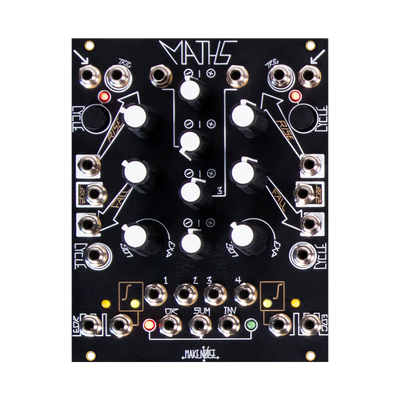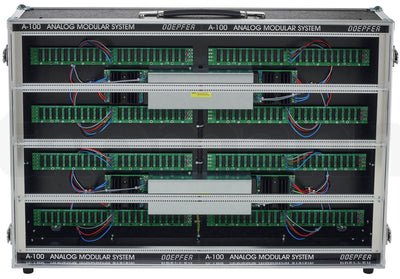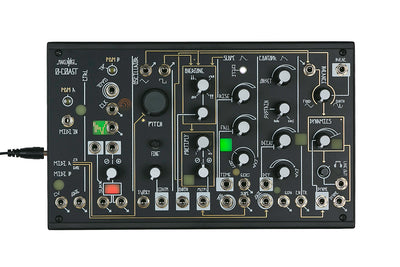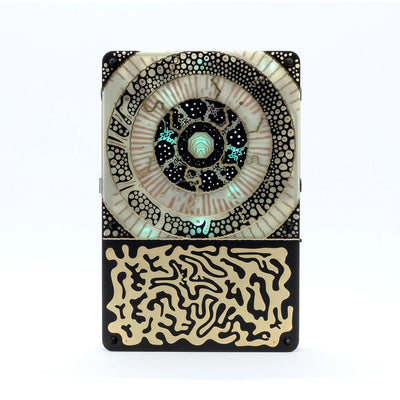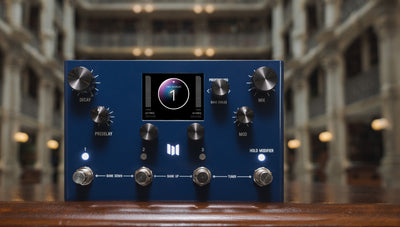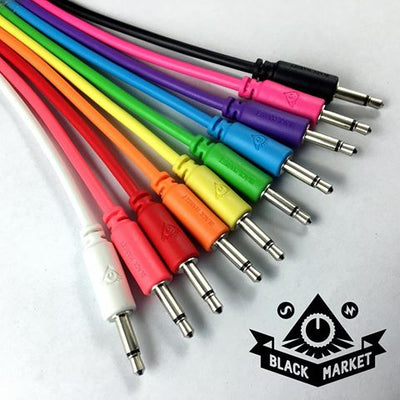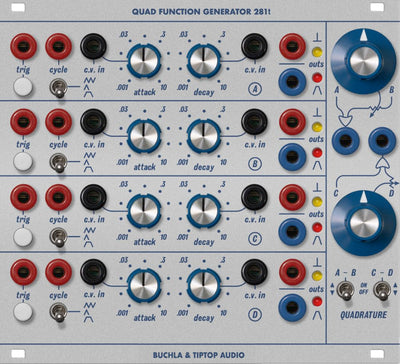Surrender yourselves to the hypnotic, borderline hysterical sway of the CHARCOT CIRCLES (named for Jean-Martin Charcot* "founder of modern neurology”) to awaken your mind and muse. Only the C. C. possesses the organic power and intelligence to identify specific sites in the brain responsible for detailed, sequential, musical functions. Was it not Doc. Jean-Martin who said: "In the last analysis, we see only what we are ready to see, what we have been taught to see."
Who can argue with that, or find fault with Marc Sirguy's compelling and mesmerizing design of our 1st eurorack collaboration with Eowave?—a 16 x 8 step sequencer, that can be utilized as an 8 x 16 step track preset (8 CVs & gates), 4 x 32 (4 CVs & gates), 2 x 64 (2 CVs & gates), and 1 x 128 step track preset (1 CV, 1 gate). CV and gate expansion is made possible through our BBOX—breakout box (not yet pictured) interface, which features 4 CVs & 4 gates. Up to 2 breakout boxes per Charcot can be connected.
Think of the hierarchy from top to bottom this way: 8 banks: a collection of up to 16 presets per bank; presets: a collection of tracks composed of 1-16 Notes; and notes: base level data, or steps. Up to 128 presets can be stored in the 8 banks of 16 presets. In TRACK PLAY—the most expressive performance mode—you decide which tracks you want to play together in the preset. In Global mode "8" for instance, tracks 1-8; 1 and 8; 1, 2, 3 and 8—just track 5, etc. In Global mode "4", tracks 1-4; 1, 2, 3; 1 and 4, etc. In Global mode "2", tracks 1, 2; 1; 2. In Global mode "1", 1 track of 128 steps.
C. C.'s Attraction and Connections
USB in/out, CV in, clock in, reset in, clock out, reset (out), velocity (out), gate (out), CV (out), are certain to attract both scientific and social notoriety. Let your predispositional creativity (think of that as the outer circle of white LEDs) mesh with an inspirational "Circles" influence (think of that as the inner circle of red LEDs) to exceed the threshold of the dissed-ordinary.
Watch what happens when you combine the Charcot Circle's traditionally meticulous design methods with your own novel experimental techniques. Will hypnotism, magnetism, the electricity of sound 'n' soul, the inducement of mania follow, or as some have termed it: "The Beatles Effect"?
THEY WILL!—when you enter the ocularcentric world of Charcot's digital amphitheater.
AT ONCE YOU ARE FEELING MORE RELAXED AND AT THE SAME TIME EXCITED... MORE IN TUNE AND IN TEMPO WITH EVERY STEP YOU SEQUENCE.
* Jean-Martin Charcot was one of France’s greatest medical teachers, clinicians and an eponym leader.

Quick Start Guide
Fastest way to get it goin' round in Circles is
here.
Sirguy's Feature Breakdown
Press Shift to select mode (large text).
Pad 1. NOTES (steps): Tap on or off to arm notes. 1/8 notes are on the outside circle, 1/16 notes inner. Press and hold a step, turn the encoder to change the pitch. Use to set track length by pressing and holding the last note/step desired; a length of 1 is shortest, 16 is longest. Press any of the 16 touch pads (steps) to set reset point—the last step in a sequence; defaults to the 16th step (for RND TRK and CLEAR see below).
Pad 2. VEL (Velocity): Sets velocity value. Press and hold a step, turn the encoder to change the amount.
Pad 3. LENGTH: Sets length of individual step—think of it as sustain. Press and hold a step, turn the encoder to increase the length to up to 16th bars.
Pad 4. RETRIG (Retrigger): Sets the amount of times the step will be repeated. Press and hold a step, turn the encoder to set the number of repeats.
Pad 5. TOUCH: Pressure sensitive “Key” mode—at this point a stepping Theremin.
Pad 6. KEY: Allows individual control of notes which sustain while pressed (let's you "walk through" your sequence without tempo); also sets note range/reset point for track 1—select one of the 16 pads for the start note, and another for the end. Very liberating feature.
Pad 7. GLOBAL: The first four default parameters set the direction or lack thereof for the sequence:
> Forward direction
< Backward direction
<> Pendulum
RND (Random) Selects a designless firing of notes. To access and change values for Global sub functions TUNE, SCALE, LEGATO, GLIDE, CHAN, SYNC, press and hold desired step, and turn encoder.
TUNE: Tunes the CV output; hold the pad and turn the encoder to adjust the overall tuning.
SCALE: Sets one of sixteen scales; default is chromatic.
LEGATO: Sets the legato; only legato notes will glide.
GLIDE: On/off & speed. Hold the pad and turn the encoder to adjust the glide time.
CHAN (Channel): Sets the base MIDI channel—you only can change the base midi channel; other tracks add that base channel # to their track number like so: if Base MIDI CH is 1, TK 1 -> CH1, TK2-> CH2... TK8-> CH8. If base MIDI CH is 4, TK 1 -> CH4, TK2-> CH5... TK8-> CH12. If base MIDI CH is 6, TK 1 -> CH6, TK2-> CH7, TK8-> CH14 and so on.
SYNC: Surrenders sequencer to external clock.
Pad 8. SHUFFLE: Sets swing before or after note.
Pad 9. LOAD: Loads preset into RAM by turning encoder, or selecting preset.
Pad 10. SAVE: Saves presets to 256 locations: 8 banks of 16 presets. Press the encoder to validate your choice.
Pad 11. BANK: Selects 1 of 8.
Pad 12. TRK (TRACK) PLAY: Selects which tracks are played together or not—sets the editing/performance mode for tracks: enable, mute, or edit.
Pad 13. RND TRK (Random Track): Sub-function of NOTES mode. Randomizes entire sequence not just direction. Continued presses produce ever more chaotic results (while in NOTES mode).
Pad 14. CLEAR: Sub-function of NOTES mode. Clears the active preset's tracks (while in NOTES mode).
Pad 15. TRACK (Groups of 1-128 steps): Selects track to be edited on outer circle—mute track on inner circle.
Pad 16. TRANSP (Transpose): Each pressure pad changes key, or turning encoder in TRANSPOSE mode changes key.
SHIFT: Press and hold for selecting feature set mode; pressed together with PLAY upon power recycle will wipe memory.
Highlights, Clarifications, and Recaps
Breakout box (BBox) allows for 4x multichannel/mult-CV use.
Up to 2 breakout boxes can be connected to generate up to 8 CVs & 8 gate outputs.
Per note/track pitch, velocity, and length, with 128 track memory locations.
Patch It
Eight patch points:
CV IN,
CLOCK IN,
RESET IN,
CLOCK (out),
RESET (out),
VEL (out),
GATE (out),
CV (out).
Patch Points Detail
CV IN – Control voltage input.
CLOCK IN – Clock source can be a square wave or gate signal (positive logic).
RESET IN – Positive voltage resets the Sequencer to the first step.
CLOCK (out) – Outputs a pulse per step. The default step setting is 1/16 (1/16th note). In note mode press SHIFT and PLAY together, then turn the encoder to divide the master tempo.
RESET (out) – Positive reset voltage output.
VEL (out) – Velocity (note/step level) output.
GATE (out) – 0/+5v trigger output.
CV(out) – Control Voltage output.
Additional Connections
USB in/out - MIDI, software update via USB HIDBootloader, importing and exporting sequence data via Max7.
Vitals
Size - 26hp
Depth - 39.7mm with ribbon cable attached
Power Usage - 85 mA +12V, 10 mA -12V



